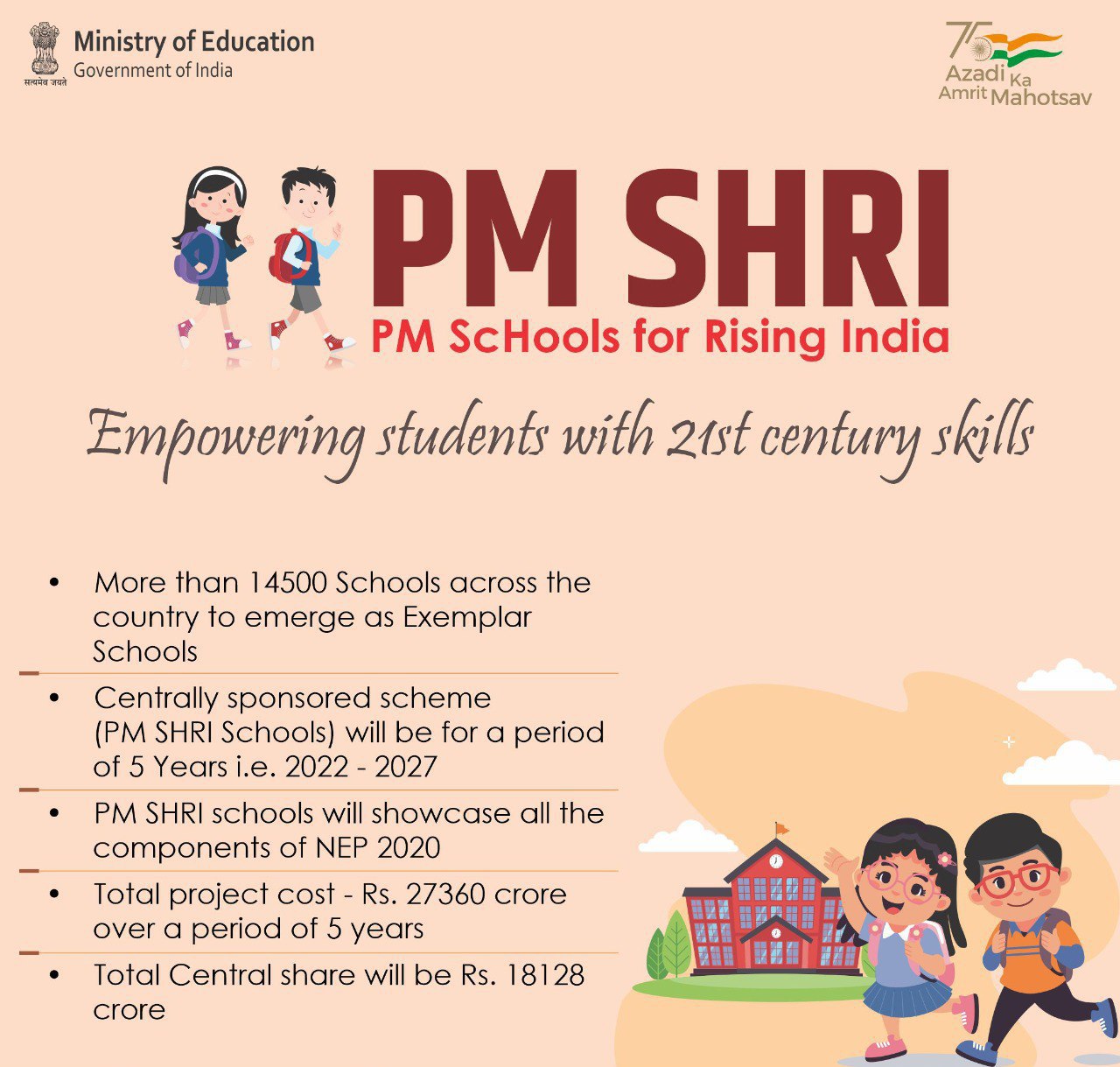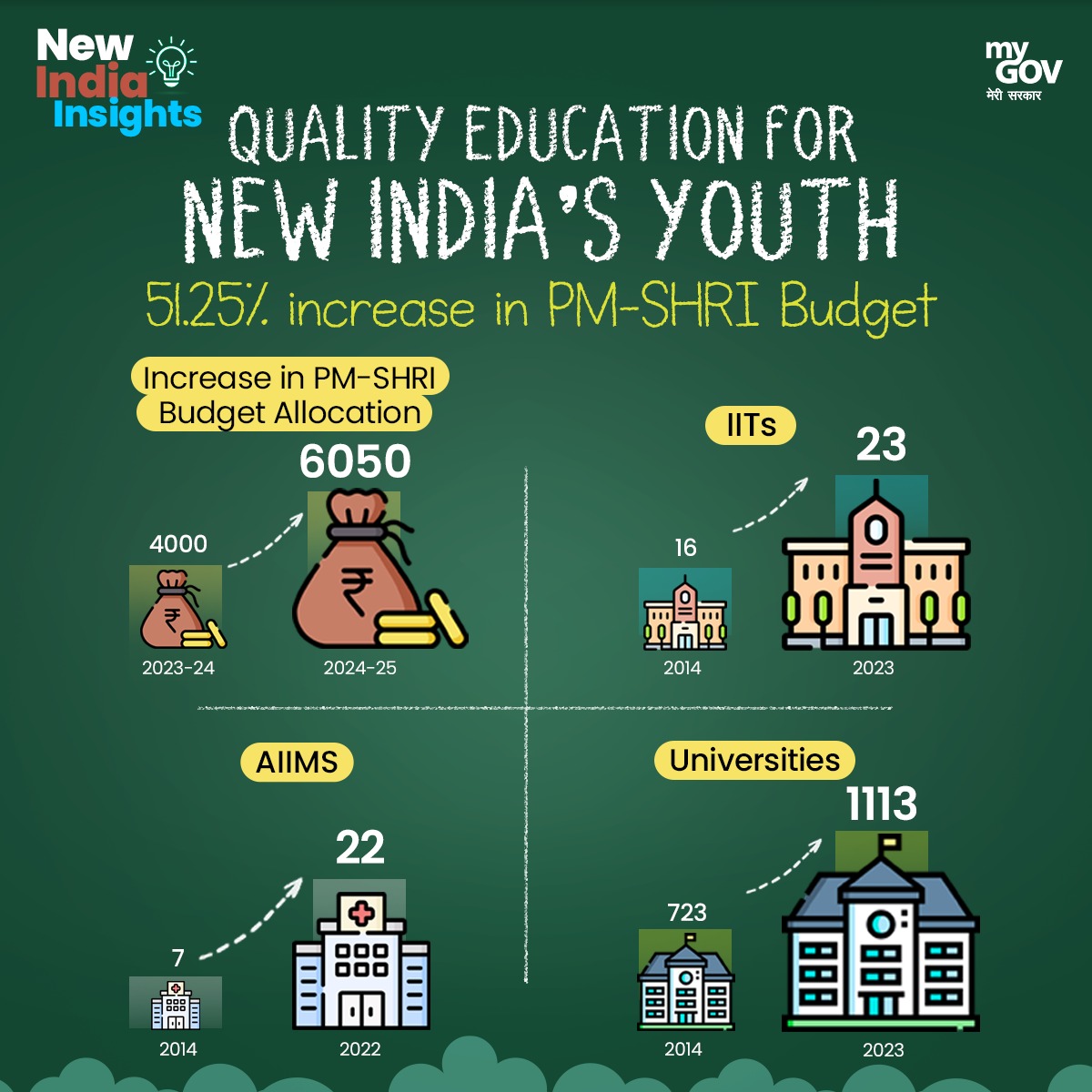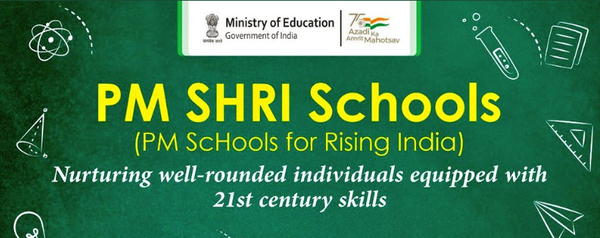Table of contents
Name: PM Schools for Rising India Scheme
Ministry: Ministry of Education
Launch Date: September 5, 2022
Aim: To upgrade and develop more than 14,500 schools across India.
What is PM-SHRI?
- PM SHRI School is a centrally sponsored scheme by the Government of India.
- This initiative is intended to develop more than 14500 PM SHRI Schools managed by:
- Central Government
- State Government
- UT Government
- Local bodies
- This will include KVS and NVS.
- These schools will be transformed into model schools showcasing all components of the National Education Policy (NEP) 2020.
- The Scheme will ensure that:
- Every student feels welcomed and cared for.
- A safe and stimulating learning environment is provided.
- A wide range of learning experiences are offered.
- A good physical infrastructure and appropriate resources conducive to learning are available to all students.
It will nurture students to become engaged, productive, and contributing citizens for building an equitable, inclusive, and plural society as envisaged by the National Education Policy 2020.
More than 20 lakh students are expected to be the direct beneficiaries of the scheme.
The Scheme is proposed to be implemented over a period of 5 years w.e.f. 2022-23 to 2026-27.


Objectives and Key Features
Exemplar and Mentorship Role
- PM SHRI schools will act as exemplary schools, demonstrating the best practices in education.
- They will also offer mentorship to other schools in their vicinity, helping to elevate the overall standard of education.
Holistic Development
- The focus is on qualitative teaching, learning, and cognitive development.
- The aim is to create well-rounded individuals equipped with key 21st-century skills.
Innovative Pedagogy
- The pedagogy will be experiential, holistic, integrated, play/toy-based (especially in foundational years), inquiry-driven, discovery-oriented, learner-centred, discussion-based, flexible, and enjoyable.
- Emphasis will be on achieving proficiency in learning outcomes for every child in every grade.
Competency-Based Assessment
- Assessments at all levels will be based on conceptual understanding and the application of knowledge to real-life situations.
- The focus will be on competency-based assessments rather than rote learning.
Modern Infrastructure
- PM SHRI schools will be equipped with modern infrastructure, including labs, smart classrooms, libraries, sports equipment, and art rooms.
- These facilities will be inclusive and accessible to all students.
Green Schools
- The schools will be developed as green schools with initiatives like water conservation, waste recycling, energy-efficient infrastructure, and the integration of an organic lifestyle into the curriculum.
Teacher Training and Capacity Building
- Teachers are receiving training to adopt innovative pedagogical methods that are experiential, holistic, integrated, and learner-centred.
- Continuous professional development programs are being conducted to ensure teachers are well-equipped to implement the new teaching methodologies.
Equitable and Inclusive Education
- The schools will provide high-quality education in an equitable, inclusive, and joyful environment.
- They will cater to the diverse backgrounds, multilingual needs, and different academic abilities of children, making them active participants in their learning process.
Implementation and Impact
- Implementation: The scheme is centrally sponsored, meaning it will be funded and managed by both the Central and State Governments.
- Impact: By transforming these schools into model institutions, the scheme aims to uplift the overall quality of education in India, ensuring that students receive a holistic and modern education that prepares them for the future.

Alignment with NEP 2020
The PM-SHRI scheme is closely aligned with the vision of the National Education Policy 2020, which emphasizes:
- Experiential learning.
- Competency-based education.
- Inclusive and equitable education.
- Integration of technology in education.
- Focus on holistic development and 21st-century skills.
Conclusion
The PM-SHRI scheme represents a significant step towards transforming the educational landscape in India.
The scheme will also promote understanding of various dimensions of the Quality of school education and inform Policy, Practice and Implementation. The learning from these schools will be scaled up to other schools in the country.
The scheme aims to provide high-quality, inclusive, and holistic education to students across the country by upgrading existing schools and aligning them with the principles of NEP 2020.
